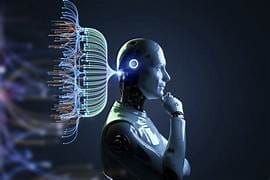Artificial Intelligence in Healthcare: Transforming the Future of Medicine
April 3, 2025 2025-04-07 16:32
Artificial Intelligence in Healthcare: Transforming the Future of Medicine
The field of healthcare is constantly evolving, with new technologies and innovations shaping the way we approach disease prevention, diagnosis, treatment, and patient care. One of the most revolutionary advancements in recent years is Artificial Intelligence (AI), which is making a profound impact on the healthcare industry. From improving diagnostic accuracy to enhancing patient outcomes, AI is transforming healthcare in ways previously thought impossible.
In this article, we’ll explore how AI is being integrated into healthcare, its benefits, challenges, and the future of AI-driven medicine.
What is Artificial Intelligence (AI)?
Artificial Intelligence (AI) refers to the development of computer systems that can perform tasks traditionally requiring human intelligence. These tasks include learning from experience, understanding natural language, recognizing patterns, and making decisions. In healthcare, AI is used to analyze data, assist in decision-making, and automate routine tasks, among other functions.
AI in healthcare can take many forms, including machine learning, natural language processing (NLP), computer vision, and robotics. These technologies enable computers to learn from large datasets, predict patient outcomes, assist in surgery, and even provide personalized treatment plans.
How AI is Transforming Healthcare
1. Improved Diagnostics
One of the most significant contributions of AI to healthcare is in diagnostic accuracy. Traditionally, diagnosing complex medical conditions has required manual assessment of patient data, medical histories, and test results. AI algorithms, particularly those using machine learning, can quickly process vast amounts of data, allowing for faster and more accurate diagnoses.
-
Radiology and Imaging: AI is already being used to assist radiologists in analyzing medical images, such as X-rays, CT scans, and MRIs. AI algorithms can detect abnormalities like tumors, fractures, and other conditions that might be missed by the human eye. Studies have shown that AI can outperform human radiologists in some diagnostic tasks, particularly in detecting breast cancer and lung cancer.
-
Pathology: In pathology, AI can analyze tissue samples and detect early signs of diseases like cancer. AI-powered systems can identify subtle changes in cells that may not be easily visible to pathologists, enabling earlier intervention.
2. Personalized Medicine
AI is also revolutionizing the field of personalized medicine, where treatments are tailored to an individual’s genetic makeup, lifestyle, and environmental factors. By analyzing vast amounts of patient data, including genomic information, electronic health records (EHRs), and lifestyle factors, AI can help doctors create more precise and effective treatment plans for patients.
-
Genomic Medicine: AI is being used to analyze genetic data and identify patterns that can help predict the likelihood of diseases like cancer, diabetes, and heart disease. This allows healthcare providers to recommend preventative measures and treatments tailored to the individual.
-
Drug Discovery: AI is also transforming the way new drugs are discovered. By analyzing large datasets of chemical compounds, AI systems can predict how different molecules will interact with the body, speeding up the discovery of new, more effective drugs.
3. Improved Patient Monitoring and Care
AI-powered devices and systems are revolutionizing patient monitoring and care by providing real-time insights into a patient’s condition and alerting healthcare providers to potential issues before they become critical.
-
Wearable Devices: Devices like smartwatches and fitness trackers are increasingly integrated with AI, enabling continuous monitoring of vital signs such as heart rate, blood pressure, and oxygen levels. These devices can alert users and healthcare providers to abnormal readings, enabling early intervention.
-
Remote Monitoring and Telemedicine: AI is also enhancing telemedicine by enabling remote monitoring of patients with chronic conditions. AI algorithms can analyze data from home-monitoring devices, allowing healthcare providers to assess a patient’s condition remotely and make timely adjustments to their treatment plans.
4. Enhancing Healthcare Operations
AI is streamlining administrative tasks in healthcare, improving efficiency, and reducing costs. By automating repetitive tasks, such as data entry, scheduling, and billing, healthcare providers can focus more on patient care.
-
Chatbots and Virtual Assistants: AI-powered chatbots are increasingly being used to handle routine patient interactions, such as scheduling appointments, answering questions, and providing follow-up care instructions. These virtual assistants can save time for both healthcare providers and patients.
-
Predictive Analytics: AI can also be used to predict patient outcomes, hospital readmissions, and the likelihood of complications. By analyzing historical data, AI models can identify patients at high risk for certain conditions, enabling healthcare providers to intervene early and improve patient outcomes.
5. AI in Surgery
Robotic surgery, powered by AI, is making procedures more precise, less invasive, and faster. AI systems assist surgeons by providing real-time data and analysis during surgery, helping them make more accurate decisions and minimizing human error.
-
Robotic-Assisted Surgery: AI-driven robotic systems, such as da Vinci surgical systems, allow surgeons to perform minimally invasive surgeries with enhanced precision. These robots can analyze data in real-time, improving surgical outcomes and reducing recovery time for patients.
Challenges of AI in Healthcare
Despite its many benefits, there are several challenges to the widespread adoption of AI in healthcare:
1. Data Privacy and Security
AI systems require access to vast amounts of sensitive health data, raising concerns about data privacy and security. Ensuring that AI systems comply with regulations like the Health Insurance Portability and Accountability Act (HIPAA) is essential to protect patient information.
2. Bias and Fairness
AI algorithms are only as good as the data they are trained on. If the training data is biased or incomplete, AI systems may produce inaccurate or biased results. This is particularly concerning in healthcare, where biased algorithms could exacerbate health disparities among different populations.
3. Integration with Existing Systems
Integrating AI technologies into existing healthcare systems can be challenging. Many healthcare facilities still rely on outdated technologies and workflows, making it difficult to implement new AI tools effectively.
4. Ethical Concerns
As AI takes on more roles in healthcare, ethical concerns about decision-making and accountability arise. For example, if an AI system makes a mistake that leads to patient harm, who is responsible—the AI system, the healthcare provider, or the developer of the technology?
The Future of AI in Healthcare
The potential for AI in healthcare is limitless. In the coming years, we can expect even greater integration of AI technologies into daily medical practices. As AI continues to evolve, we can look forward to more accurate diagnostics, personalized treatments, and enhanced patient care.
With continued advancements in machine learning, deep learning, and natural language processing, AI will become even more capable of understanding and predicting health outcomes, leading to better decision-making and improved health outcomes for all.
The future of AI in healthcare is bright, with the potential to save lives, reduce costs, and improve the quality of care for patients worldwide. However, it’s essential that the healthcare industry works collaboratively with policymakers, researchers, and ethicists to ensure that AI technologies are used responsibly, transparently, and fairly.
Conclusion
Artificial Intelligence is poised to revolutionize the healthcare industry, making healthcare more efficient, personalized, and accessible. While there are challenges to overcome, the benefits of AI in healthcare are undeniable. As technology continues to improve, AI will play an even larger role in transforming how we diagnose, treat, and care for patients, ultimately leading to a healthier and more sustainable future for all.
Related Posts
Artificial Intelligence in Healthcare: Transforming the Future of Medicine
April 3, 2025 2025-04-07 16:32Popular Tags






























